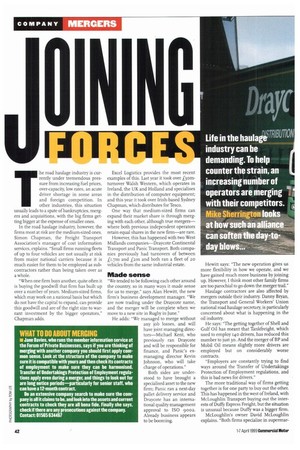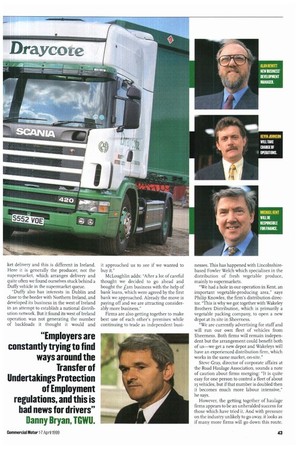N N G T he road haulage industry is currently under tremendous
Page 44

Page 45

If you've noticed an error in this article please click here to report it so we can fix it.
pressure from increasing fuel prices, over-capacity, low rates, an acute driver shortage in some areas and foreign competition. In other industries, this situation usually leads to a spate of bankruptcies, mergers and acquisitions, with the big firms getting bigger at the expense of smaller ones.
In the road haulage industry, however, the firms most at risk are the medium-sized ones. Simon Chapman, the Freight Transport Association's manager of cost information services, explains. "Small firms running fleets of up to four vehicles are not usually at risk from major national carriers because it is much easier for them to be employed as subcontractors rather than being taken over as a whole.
"When one firm buys another, quite often it is buying the goodwill that firm has built up over a number of years. Medium-sized firms, which may work on a national basis but which do not have the capital to expand, can provide this goodwill and are of the right size to warrant investment by the bigger operators," Chapman adds. Excel Logistics provides the most recent examples of this. Last year it took over bornturnover Walsh Western, which operates in Ireland, the UK and Holland and specialises in the distribution of computer equipment; and this year it took over Irish-based Sydney Chapman, which distributes for Tesco.
One way that medium-sized firms can expand their market share is through merging with each other, although true mergers— where both previous independent operators retain equal shares in the new firm—are rare.
However, this has happened with two West Midlands companies—Draycote Continental Transport and Panic Transport. Both companies previously had turnovers of between Li.7m and 12m and both ran a fleet of zo vehicles from the same industrial estate.
Made sense
"We tended to be following each other around the country, so in many ways it made sense for us to merge," says Alan Hewitt, the new firm's business development manager. "We are now trading under the Draycote name, and the merger will be complete when we move to a new site in Rugby in June."
He adds: "We managed to merge without any job losses, and will have joint managing directors—Michael Kent, who previously ran Draycote and will be responsible for finance, and Panic's exmanaging director Kevin Johnson, who will take charge of operations."
Both sides are understood to have brought a specialised asset to the new firm; Panic ran a next-day pallet delivery service and Draycote has an international quality management approval to ISO 9002. Already business appears to be booming. Hewitt says: "The new operation gives us more flexibility in how we operate, and we have gained much more business by joining up. However, I think most other family firms are too parochial to go down the merger trail."
Haulage contractors are also affected by mergers outside their industry. Danny Bryan, the Transport and General Workers' Union national road haulage secretary, is particularly concerned about what is happening in the oil industry.
He says: "The getting together of Shell and Gulf Oil has meant that TanIcfreight, which used to employ 140 drivers, has reduced this number to just 30. And the merger of BP and Mobil Oil means slightly more drivers are employed but on considerably worse contracts, "Employers are constantly trying to find ways around the Transfer of Undertakings Protection of Employment regulations, and this is bad news for drivers."
The more traditional way of firms getting together is for one party to buy out the other. This has happened in the west of Ireland, with McLoughlin Transport buying out the interests of Duffy Express Freight, but the situation is unusual because Duffy was a bigger firm.
McLoughlin's owner David McLoughlin explains. "Both firms specialise in supermar ket delivery and this is different in Ireland. Here it is generally the producer, not the supermarket, which arranges delivery and quite often we found ourselves stuck behind a Duffy vehicle in the supermarket queue.
-Duffy also has interests in Dublin and dose to the border with Northern Ireland, and developed its business in the west of Ireland in an attempt to establish a national distribution network. But it found its west of Ireland operation was not generating the number of backloads it thought it would and
it approached us to see if we wanted to buy it."
McLoughlin adds: "After a lot of careful thought we decided to go ahead and bought the Lam business with the help of bank loans, which were agreed by the first bank we approached. Already the move is paying off and we are attracting considerably more business."
Firms are also getting together to make best use of each other's premises while continuing to trade as independent busi
nesses. This has happened with Lincolnshirebased Fowler Welch which specialises in the distribution of fresh vegetable produce, mainly to supermarkets.
"We had a hole in our operation in Kent, an important vegetable-producing area," says Philip Knowles, the firm's distribution director. This is why we got together with Wakeley Brothers Distribution, which is primarily a vegetable packing company, to open a new depot at its site in Sheerness.
"We are currently advertising for staff and will run our own fleet of vehicles from Sheerness, Both firms will remain independent but the arrangement could benefit both of us—we get a new depot and Wakeleys will have an experienced distribution firm, which works in the same market, on-site."
Steve Gray, director of corporate affairs at the Road Haulage Association, sounds a note of caution about firms merging: "It is quite easy for one person to control a fleet of about 15 vehicles, but if that number is doubled then it becomes much more labour intensive," he says.
However, the getting together of haulage firms appears to be an unheralded success for those which have tried it. And with pressure on the industry unlikely to go away, it looks as if many more firms will go down tins route,




































































































